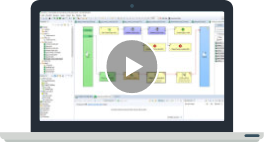-
1
Introduction
-
📽️ Introduction
-
📚 CloverDX what else
-
💪 Let’s start with Designer
-
📥 Materials for Download
-
📽️ Basic concepts and Building first transformation graph
-
📽️ Where is my window?
-
❓ Quiz – Introduction
-
-
2
First steps
-
📽️ Reading and writing flat files
-
📽️ Understanding metadata
-
📽️ Filtering data
-
📽️ Error handling
-
💪 Active customers
-
❓ Quiz – First steps
-
💪 Partitioning of payments by number of records
-
💪 Customer partitioning by state
-
-
3
Components
-
📽️ Basic Components and Work with data streams
-
📽️ Aggregation
-
📽️ Aggregation (before version 6.5)
-
📽️ Deduplication
-
❓ Quiz – Components
-
💪 Keep one customer per household
-
💪 Payments type aggregation
-
💪 Top 10 states with the most active customers
-
-
4
Enhancing your graphs
-
📽️ Making graphs more readable
-
📽️ Pipeline processing and phases
-
📽️ Using graph parameters
-
📽️ Map Component and CTL
-
❓ Quiz – Map & CTL
-
💪 Reformat address
-
💪 Business logic in CTL
-
-
5
How we really work, Server intro
-
📽️ CloverDX Server
-
📽️ Server Jobs and Projects
-
-
6
Follow up
-
👍 Feedback - Essentials
-
Essentials (pre-7.0)
Log in with your customer account and start the course immediately
Who is it for?
Essentials training is the recommended starting point for beginners but it’s also a great choice for self-taught users to make sure they have a complete understanding of all key principles and features, especially when working in a team.
What you’ll learn
You’ll be able to effectively develop basic data transformations in CloverDX, covering typical data manipulation scenarios. While the time allotted to this course allows us to only cover the core components, you’ll be well equipped to be productive in your team, explore further on your own or take our more advanced courses.
- You’ll understand key concepts and terminology to know your way around the platform and to effectively work with your colleagues.
- You’ll be able to build and deploy to production a typical data transformation job with non-trivial data manipulation tasks such as reformatting data structures, aggregation, sorting, etc.
- You’ll understand how to combine visual design and coding for greater flexibility (we’ll cover the basics of CTL, the CloverDX Transformation Language).
- You’ll learn the basics of workflow orchestration to automate more complex jobs on the Server.
How it works
- This is a self-paced course without a trainer
- Recommended duration is one week with an expected workload of 60-90 minutes a day
